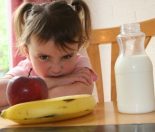The kitchen is a fascinating place for children. From pulling the pots and pans out and playing with the wooden spoons, right through the years to being able to cook the whole family their evening meal – there is a place for our kids in our kitchens. Most children find treat foods fairly irresistible, so involving them in producing their own has a special allure that can be used in so many fun, productive and educational ways.
Benefits
Involving our kids in producing the food we eat has immeasurable and lifelong benefits. Baking is especially useful in this respect as the results can be very quick and are usually delicious – so it’s easy to muster enthusiasm for the task.
Some of the benefits of baking with kids include:
- Cultivating an understanding hygiene and food safety
- Developing basic to complex mathematical skill – how to double or half a recipe, how many portions a recipe makes, how to do food costing for a batch of muffins or similar
- Building relationships with others who are involved
- Encouraging reading and following instructions
- Learning scientific principles – what role the rising agent plays, how varying the cooking time has an effect on the ingredients/product
- Developing skills for life – Learning about product labels, the contents of what we are eating and how much simpler and cheaper it can be to make ‘from scratch’ rather than buy ready prepared meals
- Producing results that are useful! Items for the school lunchboxes or snacks for when out and about all help to reduce the grocery bill in the long run.
Where to start
It’s usually best to start with a plan.
- So that the enthusiasm of your younger family members does not wane, pick the recipe in advance
- Ensure you have all the ingredients to hand
- If more than one small person is helping you with the one recipe, you will find it easier to divide the tasks before you start (taking into account age appropriateness) in order to avoid conflict. Try copying your recipe and numbering the steps, and putting initials beside each task – reserving anything involving heat, sharp knives or similar for the parent’s initials.
My nice, clean kitchen!
… Is probably not going to stay quite as nice and clean, so it’s good to think about that and prepare for it upfront. If you’ve got dinner guests or you’re short on time, today might not be the best day to start on a baking project with your kids. However the benefits definitely outweigh a bit of clean up time so when the opportunity arises and fits with your schedule – go for it! To lessen the mess, consider getting everyone an apron, have the vacuum cleaner or a broom nearby and from a young age, involve your kids in the cleanup so they understand that it is part of the process.
What are some appropriate baking tasks for the ages and stages that my children are at?
18 months to two years
- This age may be content to watch and sample!
- Do consider a young toddler’s safety if they are in the kitchen while baking is taking place
- You could also try supervising them as they hold the handle of a sieve, wipe a surface clean or stir something
- If you’re trying to keep a small person happy/safe while older children are actively baking, pull out some items from your utensil draw and a few plastic containers and sit them at their highchair or a small table with a bowl part-full of something they can play with (try rice bubbles – they’re safe to eat, fun to squash, and easy to tip/stir – and face it, you’ll be vacuuming later anyway) – you will probably find this keeps them busy for 30 minutes or more!
2-3 years
- This age will enjoy being involved but still need a fairly high level of supervision
- If seeing the bench is a strain for your child, ensure you have a sturdy stepstool or similar for them to stand on so they don’t miss out
- Establish good habits by having them wash their hands before they begin assisting with food preparation, and involve them in wiping surfaces and keeping work areas clean
- Try measuring the items into different containers and having the child add them to the main mixing bowl as you ask – they can try and identify which container you are referring to (make sure to give them lots of praise when they get it right!)
- As they get stronger they will be able to handle stirring and mixing themselves
- They are bound to enjoy adding the finishing touches – putting the walnut on an afghan for example.
3-4 years
- Many of the skills on the above list will still be of interest to children as they get older
- Put those playdough skills to good use – if you’re making rolled cookies like Belgian Biscuits, your child will be able to help roll, cut and move shapes to baking trays
- Once your mixture is prepared, your child will be able to assist with or perhaps even manage getting the product ready to bake (i.e. use a bread knife to cut scone dough into sections, spoon biscuits onto trays, help you by scraping the cake mixture from the tipped bowl into the prepared cake tin)
- Have them break up chocolate into pieces if required (some may go missing in the process!)
- Be sure to talk your child through what you are doing – how you follow the instructions on the recipe, how you measure carefully, how you scrape thoroughly so there is no waste and how they can help you clean up afterwards – you could try getting them to talk through the clean up steps – what will we do first? (put the flour away, stack the dishes, fill the dishwasher, wash the larger items) and then what do we need to do? (vacuum/sweep, wipe the bench) then what will we do? (eat some cake!)
5-7 years
- As your child develops more and more coordination and fine motor skills, their ability to decorate baking will get better. Give them challenges – moulding fondant into cupcake toppers to suit their interests, piping icing onto the top of a cake or choosing how to place nuts, chocolate or lollies onto a piece of baking are all good options
- They will also be able to understand more about safety now, so keep talking to them about the basics – use the back elements first, a parent operates the oven, putting a wet cloth beneath a chopping board to stop it from slipping, keeping work spaces clean and wiping up any spills quickly
- Peeling and/or mashing fruit for loaves or cakes and desserts
- Gathering together utensils required, preparing baking tins by greasing or lining with baking paper
- Add wet to dry ingredients, stir (it’s a good opportunity now to tell them about quick doughs like scones and muffins – which need very little mixing or they will get tough, versus cakes or biscuits which need to be fairly well mixed together, or bread/cinnamon rolls which need to be well kneaded)
- Crack in eggs
- Knead dough
- Measuring out ingredients using scales, cups, tablespoons etc.
- Cutting small, softer items with a reasonably blunt knife
- Whisking, breaking items up, sprinkling…
- Assisting with turning on a cake mixer, food processor or similar appliance
- They may be able to operate some appliances with supervision, so if you have a crepe maker, cupcake maker, waffle maker etc. think about whether you could help them operate these
- Assist with clean up.
8-10 years
- By now your child can probably follow a basic recipe themselves and using the skills they have developed. They could produce items for your tins with a bit of help to operate the oven and use sharp knives if required
- Electric beaters can be competently operated by many children of this age – try putting the bowl in the sink before using the beaters so that any splashes don’t go too far astray
- They could turn on the oven. Teach them about the oven – how putting things up high in the oven produces a slightly different result to down low or centre, where the element(s) are, how the different settings affect the elements and to remember to preheat the oven before commencing their baking project
- Melt together ingredients in a saucepan while being supervised, or in the microwave
- Now is a good time to increase skill levels – how to soften butter without melting it, how to cream sugar into butter, and how we know when items are fully cooked, what to do if a mixture appears too dry or wet to knead, as well as how to cost out and budget for food – compare the price of homemade to bought etc.
- You can judge when your child might be ready to handle sharper knives
- Now is a good age to introduce principles of food storage, best before dates, what role various ingredients play in our diets, calories in an item versus how much exercise is required to burn it off etc.
Once a child gets older than 10, and certainly into their teen years, they are capable of most kitchen tasks. Challenge them for fun – get them to create an original recipe for a cake, make two items to fill the tins for the week or bake something special for a neighbour or a relative. You are teaching them a skill that will give them pleasure and win them favour their whole life through! That’s worth getting the vacuum out again!
We’ve got some great recipes you can get your kids involved in. Check out:









